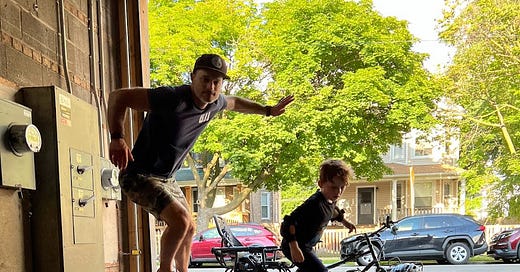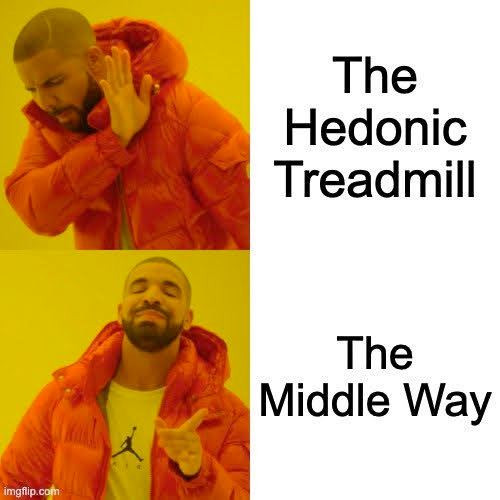🔥Welcome to Volume #00091!🔥
I’m Christian Champ. This is ☯️The Middle Way Newsletter ☯️. It is a place where I write, explore, share, and invite you along for the journey.
If you enjoy the newsletter, please share it with your friends.
🛀Why Chasing the Right Discomfort Can Change Us in a Good Way🛀
“What we do accumulates; the future is the result of what we do right now.” ― Pema Chödrön
I felt my body shivering as I counted backward from 45.
I wanted to run away. I wanted it to end.
Each Mississippi plus the number felt like an eternity.
How can 45 small seconds last so long?
Then time begins to contract as our body adjusts.
Each cycle from the hot sauna into the cold plunge pool led to the ability to increase the time in the frigid cold.
This is what happens when we chase the right discomfort. We get better at dealing with it and being uncomfortable.
Slowly like peeling away layers, we find our comfort in the discomfort.
What happens when we chase the right discomfort?
We make the discomfort go away or delay it I started at 30 seconds in the cold, and anymore seemed undoable. By the 5th repetition, 30 seconds felt easy and didn’t phase me. The discomfort threshold shifted.
We build the capacity to do it again
We want to get great at presenting, and we start with one presentation. We step up and realize it wasn’t so bad, and we do it again and again. Each time adding challenges as we advance.
We build up callouses that make it get easier and easier
It’s like starting a habit of journaling. Every day we sit in the chair and write. It starts out uncomfortable and then we find our groove. The chair starts to feel like it is part of us.
We learn about ourselves and our resilience
When our direct report asks us for help, and we want to scream and be frustrated, we figure out how to set them up for success. When our kids pull at our straws, we sink back into our breath and show up how we want them to show up. We learn the responses through doing the hard work and being resilient in our actions. The discomfort teaches
We unlock our power within
Beating discomfort makes the impossible possible. It shows us how much power we contain and the strength of our attention and focus.
When we walk into the fire of discomfort, we change our relationship with ourselves and the world. We appreciate our ability to adapt, grow and become anti-fragile.
What discomfort do you need to get comfortable with?
Do you need any support on your journey to do the hard things?
If so, reach out.
📓Things to Think About📓
Cleaning as a Super Power by Colin Wright
While doing the dishes this evening, I kept thinking about this article.
When in doubt or needing a boost, clean up a little bit to prime us for better mood, energy, and focus.
The act of cleaning—washing dishes, vacuuming the living room, making one's bed, scrubbing one's toilet—is associated with positive psychological outcomes.
Research suggests it triggers the release of exercise-related reward chemicals in our brains and bodies, helps reduce stress and anxiety, can dampen symptoms of depression, can reduce nervousness and fatigue, can improve concentration, focus, and self-reported levels of inspiration and creativity, and can actually make us healthier.
The Waiters Pad’s dictionary adds some words from Tim Urban
My two favorites are identity rocks and using the backpack metaphor. This metaphor is a powerful one for coaching and thinking about the things we carry around with us.
What rocks are in our bag just taking up space and weighing us down? While identity can be a superpower depending on the goal, thinking of ourselves as verbs is a nice reframe.
Identity rocks. Imagine identity as rocks in a backpack. We carry these rocks around with us and they can get heavy. They don’t allow us to change.
Identities serve (at least!) two purposes. First, they give us membership to a group. As evolved creatures that used to matter a lot! Second, they embody what we want to be. ‘Caring’ is embodied in religion. ‘Freedom’ is embodied in politics. ‘Change’ is embodied in movements. Disembody the sensation from the identity.
The second is the power of renaming our environment to cultivate a behavior or state of mind. Mike picks Tim Urban’s use of an idea lab and how using that term helps drive and create the culture.
Idea lab. A real imaginary place where collaborators can throw out crazy ideas and freely disagree. It’s where “ideas are like science experiments.”
Often this is in the culture of a place. One way to create this culture is by having two bosses clash. This shifts the incentive from appeasement to truth-seeking.
But naming a room “the idea lab”. That frames it nicely.
Micheal Jordan’s Hall of Fame Speech
Talking with some friends about second chapters and I started thinking about the MJ NBA Hall of Fame speech. Instead of celebrating his accomlishments and the moment, he put people on blast and called out his grevances.
Maybe this is what made MJ MJ or maybe he needed a little more grace.
And my last example of that - and the last one that you guys have probably seen - I hate to do it to him, but - he’s such a nice guy and uh. When I first met Bryan Russell - John <> will remember this - I was in Chicago in 1994. I was working out for baseball, and they came down for a workout and shoot-around and I came over to say hello. And at this time I had no thoughts of coming back and playing the game of basketball, and Bryan Russell came over to me and said ‘you know what man, why’d you quit? Why’d you quit? You know I could guard you. If I ever see you in a pair of shorts. If I ever see you in a pair of shorts.’ Remember this John? (laughs)
So when I did decide to come back in 1995, and then we played Utah in ’96, I’m at the Center Circle and Bryan Russell is sitting next to me and I look over at Bryan and I said ‘do you remember this conversation you made in 1994, or when you ‘I think I can guard you, I can shut you down, and I would love to play against you.’ ‘well you about to get your chance.’ And believe me, ever since that day, he got his chance. I don’t know how succeeding he was, but I think he had his chance, and believe me I relished on that point and from this day forward if I ever see him in shorts I’m coming at him.
🎧Things to Listen, See, and Watch 🎧
Taking a class on memes (by James McCrae), and he introduced Terrance McKenna's thoughts on what is a meme along with the crying Jordan meme from his Hall of Fame speech.
Since the richest person might be the ultimate meme master, it feels like this is a good skill to practice and hone.
His main points.
Memes aren’t meant to be collected and passed around.
They propagate if you remember it, replicate with fidelity, without information degradation.
Memes can also break down when information degradation happens or they close out.
The most open-ended memes prevail.
A good meme doesn’t foreclose its options and preserves a lack of closure.
Dominator ego is like being stupid because it always searches for closure. It wants to find the end. Openendedness is seen as a threat.
🙏A reader sent me this meme when I asked him if he is making any memes.
Michael Gervais of the Finding Mastery Podcast speaks with Mary Helen Immordino-Yang about changing the way we teach and learn
The education system doesn’t work because it is not focused on why we are learning things and not focused on learning development
School should support the growth and development of young people as they engage with difficult and new ways of doing and thinking about things
Focusing on recall and retrivat is not the answer… how does the knowing change how you interact in the world? How does the knowing change our dispositions of mind?
The strucutre of schools doesn’t serve the basic human capacities (feelings, beliefs, values, skills and experiences) and we are dynamic and complex people
We need to understand the mental, physical, nutritional, pyschological and medical and optimize for each one for our goals (like an athlete trying to perform at an olympic level)
We need to deconstruct beliefs and values to see how we want people to think and feel when being in the process of learning
Context matters and we need a meaning or narrative around the why we are doing something or learning something and where we need to do it. When we create the skill where do we want to use the skill?
We need to teach people to manage their arousal regulation (emotional management), default mode network, and then the executive control network (brain networks to do the activity including visualization of it). Then adding meaning or story of why we are doing it.
We need to keep in mind that our systems are complex, dynamic and emergent
Her daughter went to school in Denmark for a year where they solved math problems with real life examples vs. just taking tests. This lead her daughter to realize that she needed grades like someone needed a boyfriend to sit next to them at lunch.
The US system causes kids to wait for someone to tell them what to do and pat them on the head when they do it well
School redesign is about the beliefs and values you are aiming for … is it self actualization / high quality development and kids engaging deeply with the work
Need to show parents and teachers what learning actually is… a standardized very rigid system of accountability, achievement and high stakes testing ot judge the education outcomes isn’t the right anwer
Teachers have the challenging job of helping kids steer into the learning process and support development
What can parents do? —> Shift the home conversation by engaging in thoughtful questions and listening. How are your kids thinking? Do things together and stop and unpack things. Engage in a process oriented way and take the power away from the standardized test metrics.
Kids are talking like people in the modern workforce…. how am I going to get all this work done I’m sitting at my desk all day (or in the workforce its I’m sitting in meeting after meeting after meeting)?
You want your kids (and yourself) to interact with things in a systematic, deep intellectual way which our school don’t value
💣Words of Wisdom💣
“The most difficult times for many of us are the ones we give ourselves.” (Pema Chödrön, When Things Fall Apart)
“I used to have a sign pinned up on my wall that read: Only to the extent that we expose ourselves over and over to annihilation can that which is indestructible be found in us...It was all about letting go of everything.” (Pema Chödrön, When Things Fall Apart)
"I think it can be attributed to adopting the wrong model in our attempts to understand what we were looking at. We can only ever understand anything by comparing it with something else that we think we already understand better." (Iain McGilchrist, The Divided Brain)
“As we grow older, we become more rooted in the past. Habit takes over. Something that has worked for us before becomes a doctrine, a shell to protect us from reality. Repetition replaces creativity." (Robert Greene, The 33 Strategies of War)
"The problem with friends and family is that they know us as we are. They are invested in maintaining us as we are. The last thing we want is to remain as we are." (Steven Pressfield, Do the Work)
"Talented people make each other better, often in dynamic, nonlinear fashion, and this holds for intelligence as a measure of talent as well." (Tyler Cowen, Talent)
"Despite a lack of natural ability, I did have the one element necessary to all early creativity: naïveté, that fabulous quality that keeps you from knowing just how unsuited you are for what you are about to do." (Steve Martin, Born Standing Up)
"We don’t see ourselves as the problem because, in fact, we aren’t. What we are saying does make sense. What’s often hard to see is that what the other person is saying also makes sense." (Douglas Stone, Bruce Patton, Sheila Heen, Difficult Conversations)
The master,” an old martial arts saying goes, “is the one who stays on the mat five minutes longer every day than anybody else.”" (George Leonard, Mastery)
🙏Thanks for Reading🙏
What discomfort do you need to embrace and play with?
Any thoughts or comments, please share!
Namaste,
Christian
The team hitting the ramps this summer in year 3 of us skating (Isaac, is in year 1, and was resting on the ramps after finishing his session earlier).


















Share this post